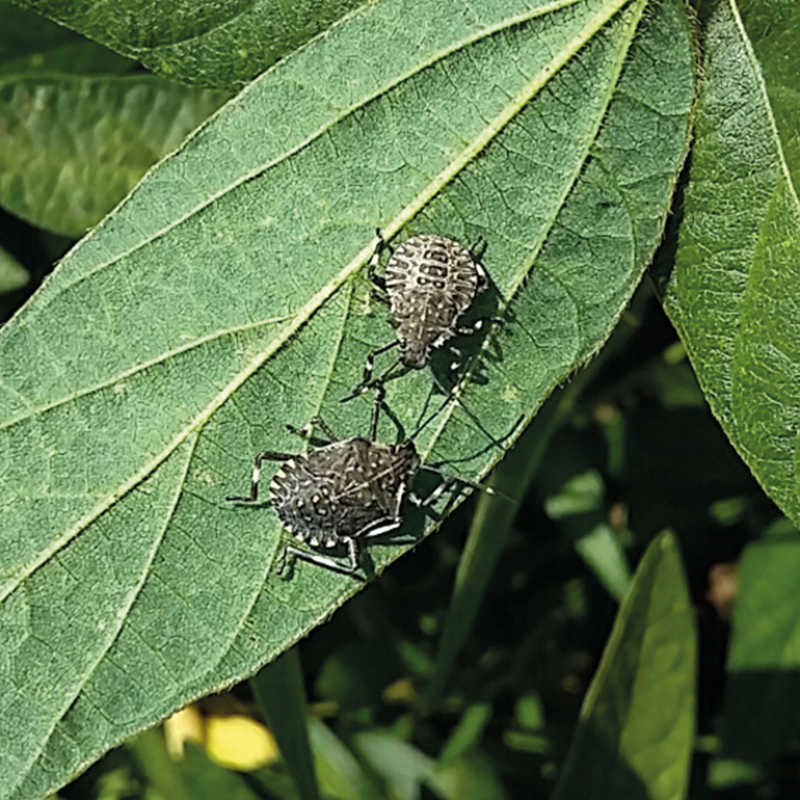
From the Brown Marmorated Stink Bug to the new alien insects: the high cost of globalization in the fields
By Alessandro Guarnone, Head of Research and Development at Sipcam Italia
Globalization – Invasive species in crops
In Italy there are about 500 species of alien insects, the presence of which is mainly due to the intensification of global trade. They come from America (37%), Asia (29%), Africa (14%), Australia (6%) and other countries (14%) (source: DAISE, Delivering Alien Invasive Species in Europe). The best known is the Asian bedbug (Halyomorpha halys), or the brown marmorated stink bug, originally from China and Japan, was found in 2012 in the Modena area. From there it spread and had devastating consequences for the cultivation of fruit, vegetables and industrial crops in the Po Valley. Pear trees were particularly affected, as well as apple trees, peaches, nectarines, kiwis and hazelnuts. According to the Fruit and Vegetable Service Center* (CSO) in 2019, the year of greatest intensity, the damage exceeded over 500 million euros. There is no shortage of trouble for citizens: in some areas of the North-East there are frequent clusters near homes, between door jambs and locks where they take shelter in winter. Equally harmbul is the Japanese beetle (Popillia japonica), identified in 2014 in the Ticino Park, between Piedmont and Lombardy, included in the list of priority pests at European level in 2019. It has a dangerous expansion front of ten kilometers a year, the larva feeds on grass roots, the adult causes defoliation of numerous plant species, fruit trees, vines and forest plants.
Brown Marmorated Stink Bug, not the only invasive species
Just as frightening is the small fruit fly (Drosophila suzukii), native to Southeast Asia. Noted in Italy in 2009 in Trentino-Alto Adige, it has spread in several Italian regions. It is especially unhealthy for crops with intensely colored fruits (cherries, strawberries, blueberries and raspberries). The Veneto and Trentino-Alto Adige regions estimated losses of up to 10 million for the cherry tree and almost 2.5 million for small fruits in 2016. In the Province of Trento, 30% of blueberry production was lost in critical years. Also harmful is the chestnut beetle (Dryocosmus kuriphilus), a wasp from China, accidentally imported in the 1990s to the Cuneo area, noticed in 2002. It is the most harmful insect in the world for the chestnut: it reduces its fruit production and can eventualy cause death. Over the years it has generated production losses of 90% of the harvest, starting with the Piedmontese chestnut groves, and then spreading over a large part of the territory. The flare-up, even if not constant, in Tuscany and Campania are worrying.
Innovation - Pest management
The agro-pharmaceutical industry collaborates with the appointed public organizations (Regional Plant-health Services)*, universities, research centers and individuals, investing in research and innovation. Sipcam Oxon, for example, to combat the Asian bedbug and the Japanese beetle has developed specific traps and types of pheromones, chemicals that sexually attract insects, in collaboration with a well-known specialized United States company and some universities. Research is also underway on Attract & Kill (A&K) systems which will conitnue to develop in the future. The other front is that of natural "limiters", species that fight non-native insects. The restoration of chestnut cultivation in Piedmont is exemplary thanks to the action of the region and the University of Turin which led to the introduction of a natural parasite (Torymus sinensis), which is defeating the chestnut gall wasp, after being successfully tested in Japan in the 80s. The samurai wasp (Trissolcus japonicus) was introduced in some Italian regions since 2020 under the banner of CREA (Agricultural Research Council and Agricultural Economics Analysis)* to eradicate the Asian bug: we are still at the beginning, but the results are promising.
Searching for solutions
The agro-pharmaceutical industry has set itself a goal of overcoming alien species while protecting the environment and biodiversity. However, we do not yet know how the European Green Deal will be interpreted in this battle, but we hope for funding to strengthen control measures, research and above all to further new technologies and genetics. In addition, European legislation is the most stringent for registering crop protection products and this does not facilitate the arrival of new molecules to combat non-native species. Prevention and controls work, but simplifying some steps in the authorization processes could accelerate the availability of solutions especially for so-called minor crops which, already penalized for the limited availability of pesticides, could be further penalized by the arrival of new alien insects. Finally, I would like to quote the appeal made by former UN secretary Ban Ki-moon: “Individuals are also responsible. Compliance with local and international quarantines and customs regulations make it possible to avoid the spread of harmful insects, harmful plants and disease. A simple rule: leave living organisms in their natural habitat ”.


